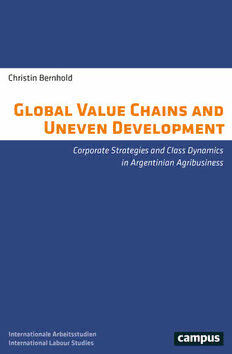
Global Value Chains and Uneven Development: Corporate Strategies and Class Dynamics in Argentinian Agribusiness PDF
02023·4.357 MB·English
Most books are stored in the elastic cloud where traffic is expensive. For this reason, we have a limit on daily download.
Preview Global Value Chains and Uneven Development: Corporate Strategies and Class Dynamics in Argentinian Agribusiness
Description:
An empirical examination of the development pitfalls involving global value chains. In institutions such as the World Bank, global value chains (GWK) are thought to offer opportunities for economic and social upgrading all over the world. However, according to Christin Bernhold, this assumption is neither theoretically nor empirically tenable. Global Value Chains and Uneven Development presents an ideology-critical discussion of GWK research that is supported by in-depth empirical research into upgrading strategies in Argentinian grain and oilseed value chains, their class and power dynamics, and the ensuing unequal socioeconomic outcomes. In Argentina, business associations organize themselves along agricultural value chains in order to assert particular interests, and while conditions of exploitation and the unequal geographies of capitalism may be reshaped for the benefit of a few, they are far from abolished.
See more
The list of books you might like
Most books are stored in the elastic cloud where traffic is expensive. For this reason, we have a limit on daily download.
